Photographs: Reinhard Krause/Reuters
Australia has issued a travel advisory to its citizens not to travel to India.
Justine Bowden, whose company Beltin Group will provide advisory and security to the Australian media during the CWG, says the delay in infrastructure development has affected the ability of counter-terrorism teams to train and plan contingencies for the sites.
In this interview with Rediff.com's Vicky Nanjappa, Dr Bowden speaks about Sunday's attack at Delhi and what the thinking is in the Australian team, which is on its way to attend the Commonwealth Games.
'We must plan for attacks that are more unpredictable'
Image: The vehicle in which the Taiwanese tourists were travelling on SundayPhotographs: B Mathur/Reuters
Do you think it was aimed at creating fear in view of the Commonwealth Games?
The recent event is unfortunately not a surprise.
Any analysis of the situation cannot be taken without due regard to instabilities in the region and expectations of ongoing levels of unsophisticated attacks in an effort to promote instability of the Indian government.
The attack that took place was not a sophisticated one.
Do you think it was some smaller group which carried out the attack in order to gain some publicity?
The Indian Mujahideen are possible executors of this act. However, this action in itself shows the concern we have had for some time, with recent evidence showing financial sponsorship of unsophisticated militant groups by the Taliban and Lashkar-e-Tayiba.
This means classic intelligence analysis and modelling based on historical assessment is limited.
We must plan for attacks that are more unpredictable, have little if any warning of occurring and are less targeted.
The outcome of this is the generation of more fear within the community due to the chaotic and uncontrolled nature of attacks, greater number of casualties, however less fatalities due to the reduction in planning opportunities and sophistication.
'The attack hasn't changed our position regarding CWG'
Image: A policeman stands guard at the Major Dhyan Chand National Stadium in New DelhiPhotographs: Adnan Abidi/Reuters
Do the players feel comfortable enough to travel to India?
I cannot speak directly for officials and athletes who are expected to attend the Games.
Media coverage in Australia has shown that the majority of athletes and officials plan to attend.
However, many family members of those attending are worried for their welfare and are undecided as to whether they will attend or not.
Many parents, of course, want to go because their children are competing.
Your group is handling the protection of the Australian media. What is the thinking in media circles today?
We have conducted 18 months of safety and security planning, risk assessment, training and provision of security staff that will support media operations in India.
This event has not changed our position; it has reinforced the work that we have done to date, and confirmed contingency planning.
We are working hard to mitigate the risks posed to the Australian and New Zealand media within what is a challenging security environment.
'Delay in infrastructure development affects counter-terrorism ability'
Image: Work on at the Major Dhyan Chand National Stadium, one of the venues for the Commonwealth GamesPhotographs: Adnan Abidi/Reuters
We have received statements that the Games will be safe and secure.
However, advice to Australian travellers is to exercise a high degree of caution in India at this time because of the high risk of terrorist activity by militant groups.
It further states: Australians in New Delhi should be aware that the Commonwealth Games will be held in a security environment where there is a high risk of terrorism.
Perry Crosswhite of the Australia Commonwealth Games Association has stated: The ACGA remains of the view that there is an acceptable level of security being provided for our 2010 Commonwealth Games team in Delhi.
How prepared do you think India is to host the Games?
There is a lot of very well intentioned people on the ground and I personally have a lot of respect for the people of Delhi and the authorities of India.
However, the delay in infrastructure development affects the ability of counter-terrorism teams to train and plan contingencies for the sites, which in turn leaves little opportunity for interagency containment and offensive operations exercises on the ground.
I am concerned with issues of interagency communication at an incident, explosive ordinance search protocols that should have commenced for the lockdown of venues and facilities, the security vetting of workers, contractors and numerous persons that have access to sites and venues, and co-ordination of transport and administrative functions associated with the CWG.
'We do not support a 'no go' to Delhi'
Image: A view of a squash stadium in New DelhiPhotographs: Adnan Abidi/Reuters
Exercise a high degree of caution in India at this time because of the high risk of terrorist activity by militant groups.
Terrorist attacks could occur at any time anywhere in India with little or no warning.
There has been a travel advisory from Australia against travelling to India.
We are of the view that terrorists win when we are fearful to act. We do not support a 'no go' to Delhi.
We should, however, be mature and aware of the risks in which we operate and adopt appropriate measures to ensure the safety of ourselves and contact with our families while abroad.
Have there been any alterations to the team or dropouts following the latest attack in Delhi?
No.
Perry Crosswhite has assured you that everything would be fine at the CWG. Has there been any change in his stance now following this attack?
No.

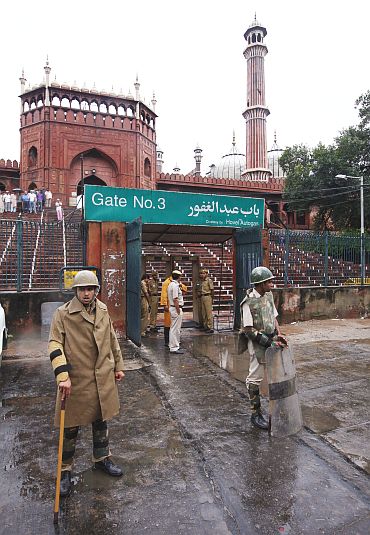
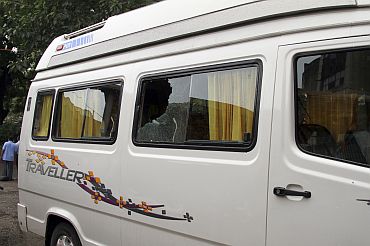
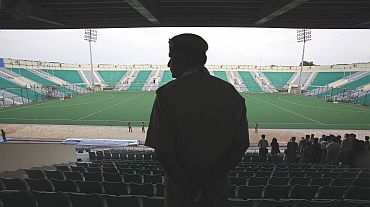
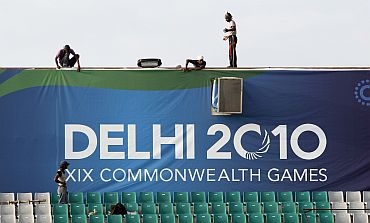
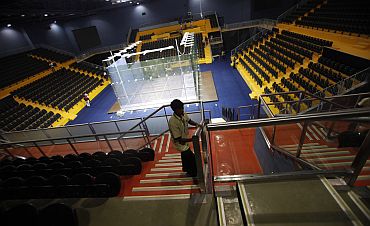
article